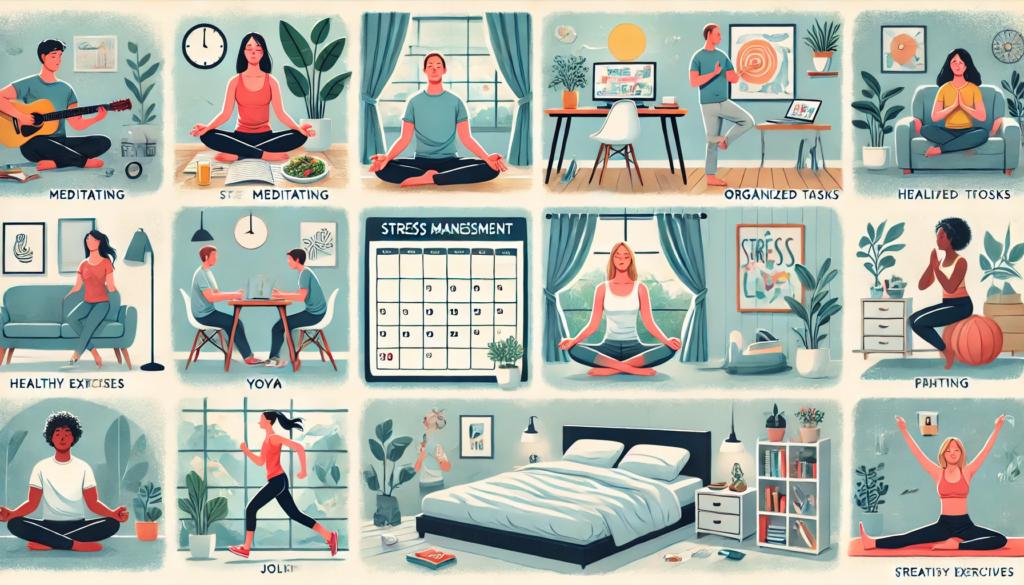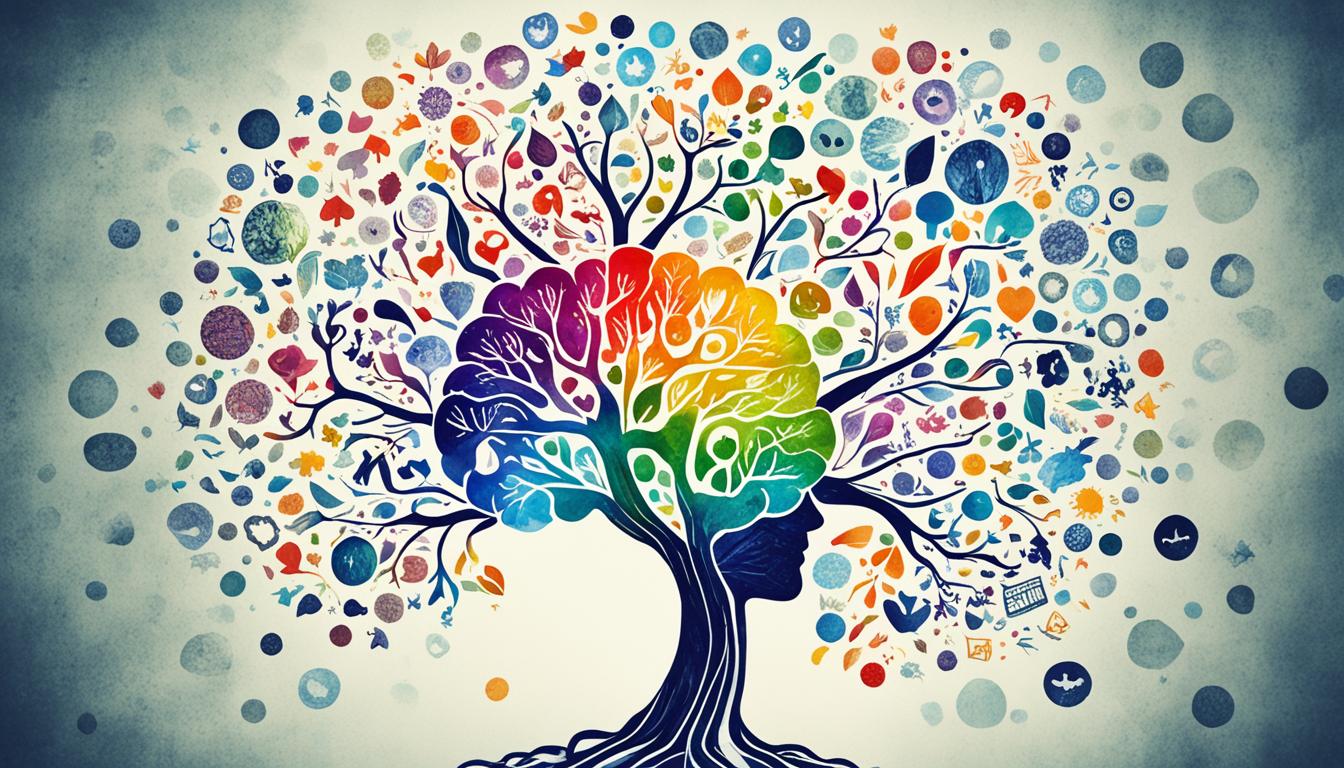Have you ever found yourself rushing, feeling overwhelmed with tasks and anxious? Stress is tough, but we can overcome it. In this text, we’ll discuss ten effective ways to deal with stress and achieve a more balanced life. These tips will help you feel more relaxed in your daily life.
Key Learnings
- Understand the signs and symptoms of stress to identify it in time.
- Practice regular physical exercise to relieve tension.
- Adopt a healthy diet rich in essential nutrients.
- Try breathing and meditation techniques to calm the mind.
- Set priorities and manage your time better.
Understanding Stress and Its Impacts
Stress affects many people today. It can even increase our desire to work. But when we become too stressed, our health can suffer. Let’s see what stress is and what signs it shows.
What is Stress?
Stress is our reaction to challenges that seem greater than our strength. When we feel fear, even if it is about something that is not real, our body reacts. It prepares to fight or flee from danger. However, this mechanism is not good if it happens every day.
Signs and Symptoms of Stress
Stress shows that something is not right in various ways. This influences many aspects of our lives. Some signs include:
- Irritability and mood swings
- Difficulty concentrating
- Sleep problems
- Muscle tension and headaches
- Fatigue and exhaustion
- Digestive problems
- Increased blood pressure
It is essential to recognize these signs to manage stress properly.

“Stress is more than a physical reaction. It affects our emotions and harms our health.”
Understanding how stress works is the beginning of better self-care. Let’s explore techniques for effective management. We aim to help maintain your health and balance in daily life.
Practicing Regular Physical Exercise
Exercising is very good for stress. Various activities can reduce tension and lift your mood. When done frequently, these exercises greatly benefit the body and mind.
Frequent practice lowers the stress hormone, cortisol. They also make your body release endorphins. This improves your day and makes you feel good. Moreover, it helps you sleep better, which is essential for dealing with stress.
The best activities for stress are:
- Brisk walking
- Aerobic activities, like running, swimming, or cycling
- Strength exercises, such as weight lifting
- Ancient techniques, like Yoga and Tai Chi. They combine movement, breathing, and meditation.
Choose something you enjoy to maintain discipline. And try to set aside 30 minutes, almost every day, to practice something that relaxes you.
Exercising not only improves the body but also the mind. Going to the gym or running can reduce anxiety and depression. Your self-esteem and focus also improve significantly.
Therefore, incorporating exercise into your routine is very helpful. It maintains physical and emotional balance, leading to a healthier and happier life.
Adopting a Healthy Diet
Having a healthy diet helps to face stress. Foods rich in essential anti-stress nutrients strengthen the body. They help us better handle daily problems. Let’s talk about the main foods and tips for a healthy anti-stress diet.
Essential Nutrients to Combat Stress
Here is a list of anti-stress nutrients:
- Vitamins B1, B6, and B12 are key for the nervous system and energy.
- Vitamin C is essential to boost the body’s defense and fight stress.
- Magnesium is important for mental and muscular well-being, reducing tension.
- Omega-3, in fatty fish, fights inflammation and improves mood.
Tips for a Balanced Diet
Want to eat well to get rid of stress? Here are the key tips:
- Choose whole foods, such as grains and fruits, which are rich in nutrients.
- Add lean proteins to your diet; they regulate cortisol, the stress hormone.
- Drinking water is essential. Avoid coffee and sodas, which are stimulants.
- Prefer fresh foods instead of processed ones, which are full of salt and sugar.
- Plan what you’re going to eat. This helps maintain a balanced diet.
By eating healthily, you provide your body with what it needs to face challenges. Thus, you have more strength, energy, and peace for daily life.

Breathing and Meditation Techniques
Breathing and meditating are powerful ways to handle stress. They bring many benefits to the body and mind. They help relax, reduce tension, and find balance.
Benefits of Meditation for Stress
Daily meditation helps a lot against stress. Science has shown that it can:
- Lower cortisol levels, the stress hormone
- Reduce muscle tension and blood pressure
- Help you sleep better and be more focused
- Make you calmer and happier
- Improve your emotional balance and how you face challenges
Breathing and meditating are great ways to control stress. Practicing this regularly will lead to a more peaceful life. It also greatly benefits your overall health.
| Breathing Technique | Benefits |
|---|---|
| Diaphragmatic Breathing | Reduces anxiety, improves oxygenation, and calms the nervous system |
| 4-7-8 Breathing | Reduces stress and induces a state of relaxation |
| Square Breathing | Balances stress levels and improves concentration |
“Meditation is not about getting rid of thoughts but learning not to identify with them.”
Stress and Sleep: Seeking Balance
Stress greatly interferes with our sleep. When we are very stressed, sleeping can be difficult. This negative cycle can worsen both problems. But there are tips to improve sleep and stress.
Tips for Improving Sleep Quality
Having healthy sleep helps deal with stress. Here are some tips for better sleep:
- Establish a consistent sleep routine: Go to bed and wake up at the same time every day, even on weekends.
- Create a sleep-friendly environment: Keep the room dark, cool, and quiet, avoiding exposure to bright lights and screens before bedtime.
- Limit the use of electronic devices before sleeping: The blue light emitted by smartphones, tablets, and computers can interfere with melatonin production, a crucial sleep hormone.
- Practice relaxation techniques: Try activities like reading, meditation, yoga, or breathing exercises before bed to calm the mind and body.
- Avoid excessive caffeine and alcohol consumption: Caffeine can make it difficult to fall asleep, while alcohol can impair sleep quality.
These tips will help you sleep better. This will help reduce stress. It will be very good for health and well-being.
| Factors that Disrupt Sleep | Factors that Improve Sleep |
|---|---|
| Stress and anxiety | Regular sleep routine |
| Excessive use of electronic devices | Comfortable sleep environment |
| Caffeine and alcohol consumption | Relaxation techniques |
| Poor sleep hygiene | Healthy diet |
“Good quality sleep is essential for physical and mental health. Taking care of your sleep is one of the best ways to effectively manage stress.”
Managing Time and Setting Priorities
In this section, we will show effective ways to manage time. Learning to organize your routine helps reduce stress and anxiety. Let’s focus on what’s most important to you.
Start by understanding your main tasks. List everything you need to do. Organize these tasks from most important to least.
Then make a realistic plan for each day or week. Use agendas or apps to schedule yourself. Don’t forget to include time for rest and leisure. This is crucial for your mental health and efficiency.



https://t.me/Top_BestCasino/2
Yo, 56jllogin is the real deal. Super smooth interface and easy to navigate. Been having some good luck here lately! Check it out 56jllogin.
Your article helped me a lot, is there any more related content? Thanks!
Can you be more specific about the content of your article? After reading it, I still have some doubts. Hope you can help me. https://accounts.binance.com/en-NG/register?ref=YY80CKRN